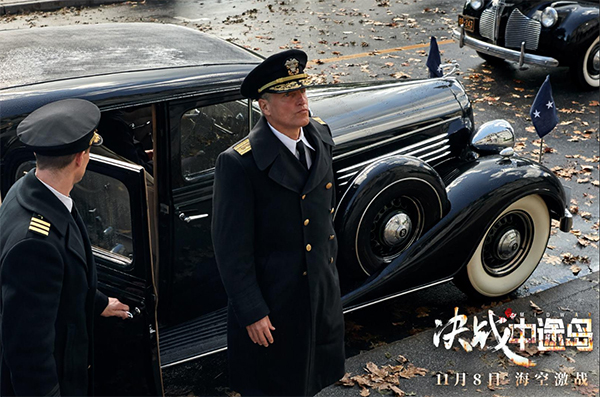Roland Emmerich and his thrilling box office hits over the years — from Independence Day to Godzilla and The Day after Tomorrow — have been etched into the minds of Chinese film fans as the definition of Hollywood blockbusters.
The director's excellence in shooting special effects has won him a reputation among his Chinese fan base as, jokingly, "the man who is best at destroying Earth" in Hollywood.
Recently, Emmerich returned to Chinese theaters with his war epic Midway, which revisits one of the most pivotal battles in the United States Navy's history.
 |
A scene from Midway. [Photo provided to China Daily] |
As of Wednesday, the film, which opened across Chinese mainland on Friday, had grossed 142 million yuan ($20.2 million).
Recently knocking down local hit Better Days, Midway has occupied the top place in the box office charts and obtained a score of 7.6 points out of 10 on Chinese review website Douban.
The idea for the film came from a documentary that Emmerich watched around 20 years ago, recalls the 64-year-old German director following a preview screening at a downtown Beijing cinema on Nov 3.
"I immediately realized it (the Battle of Midway) is one of the biggest comeback stories in World War II. It was interesting to find that the Americans were the underdog and the Japanese naval forces were much more well-trained and stronger," says the director.
 |
A scene from Midway. [Photo provided to China Daily] |
An epic conflict between the United States and Japan that played out six months after Japan's attack on Pearl Harbor, the Battle of Midway — lasting from June 3 to June 6 in 1942 — saw US forces destroy Japan's first-line carrier strength and most of its elite naval pilots, forcing the turning point in the Pacific theater where the war swung in favor of the Allies.
Although Emmerich formed an idea for the film as early as the 1990s, he failed to get a green light from Columbia Pictures, which had recently been purchased by Sony Pictures with backing from Japanese banks.
However, in 2017, the stalled project reached its own turning point. A Chinese studio, Bona Film Group, staked around $80 million to lead the investment on Midway, which became the biggest deal made during the 70th Cannes Film Festival.
 |
A scene from Midway. [Photo provided to China Daily] |
Yu Dong, founder and president of Bona, who also attended the Beijing premiere, recalls that Emmerich talked for two hours to elaborate upon his idea and express his passion for Midway near the French seaside city two years ago."I was completely convinced and decided to get on board immediately," says Yu.
This also brought China a bigger presence in Midway, which has some scenes featuring the surviving American pilot, Jimmy Doolittle, protected by locals during Japanese searches and bombing raids in southeastern China after the Tokyo Raid is carried out.
Also known as the Doolittle Raid, the aerial bombardment was the American revenge for the Pearl Harbor attack, and took place on April 18, 1942. However, the raid over the Japanese capital and other places on Honshu forced most of the crew to land in China due to a lack of fuel to return to their aircraft carriers.
For Yu, the new film can also be viewed as a sort of follow-up to Michael Bay's 2001 film Pearl Harbor. He added the improvement of cinematic technology over past two decades means that Midway delivers more spectacular visual effects.